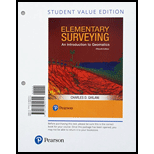
ELEMENTARY SURVEYING (LOOSELEAF)
15th Edition
ISBN: 9780134604701
Author: GHILANI
Publisher: PEARSON
expand_more
expand_more
format_list_bulleted
Concept explainers
Textbook Question
Chapter 3, Problem 3.23P
Line AD is observed in three secwknns, AB, BC, and CD, with lengfl'ls and standard devdlafitinns as listed below. What is the totah length AD and its standard deviatinn?
3. AB = 456.78 :I: 0.03 ft; BC 2 524.50 :1: 0.04 ft}; CD = 692.35 d: 0.05 ft.
b. AB = 299.090 111 :I: 0.005 111;.30 = 336.447 111 :I: 0.006 m;C'D = 465.837 111 :I: 0.008 In
Expert Solution & Answer
Want to see the full answer?
Check out a sample textbook solution
Students have asked these similar questions
A floor consists of 8 steel beams/girders supporting three 1-way slab panels. The
beams are supported on 6 columns around the perimeter of the roof. The roof is
subjected to a uniform pressure of 150 psf . All beams and girders weigh 90lb//ft.
Use free-body diagrams and statics equations to determine the load and reactions
on all the beams (Beam 1, 2, 3 and 4), girders (Girders 1 and 2), and columns
(Columns 1, 2 and 3).
(we only focused on one-way slabs in the class + pls include FBDs)
Design an intake tower with gates meet the following requirement:
• Normal water surface elevation = 100 m mean sea level
• Max. reservoir elevation = 106 m msl
• Min. reservoir elevation = 90 m msl
• Bottom elevation = 81m msl
• Flow rate=57369.6 m³/day.. Velocity = 0.083 m/s
⚫c=0.6, Density for water =1000 kg/m³. Density for concrete =2310 kg/m³
Estimate water elevation that make safety factor =1
ร
4 m
Uppr gate
2m
1 m
Lower gate
2m
Gate
6m
2m
4 m
ร
2 m
wz
4. The storm hyetograph below produced 530 acre-ft of runoff
over the 725-acre Green River watershed. Plot the storm
hyetograph and compute and plot the excess rainfall
hyetograph using the op-index method.
Time (hours)
0-33-66-99-12 12-15
Rainfall Intensity (in/hr) 0.2 0.8|1.2 1.8 0.9
Chapter 3 Solutions
ELEMENTARY SURVEYING (LOOSELEAF)
Ch. 3 - Discuss the differences between an error and a...Ch. 3 - Prob. 3.2PCh. 3 - Prob. 3.3PCh. 3 - Prob. 3.4PCh. 3 - Discuss the diffexrence between accuracy and...Ch. 3 - Prob. 3.6PCh. 3 - Prob. 3.7PCh. 3 - Prob. 3.8PCh. 3 - Prob. 3.9PCh. 3 - Prob. 3.10P
Ch. 3 - Prob. 3.11PCh. 3 - Prob. 3.12PCh. 3 - Prob. 3.13PCh. 3 - Prob. 3.14PCh. 3 - 23°3fi'fififi, 23°30'1EH], 23"30'100, and...Ch. 3 - Prob. 3.16PCh. 3 - Prob. 3.17PCh. 3 - Prob. 3.18PCh. 3 - Prob. 3.19PCh. 3 - Prob. 3.20PCh. 3 - Prob. 3.21PCh. 3 - Prob. 3.22PCh. 3 - Line AD is observed in three secwknns, AB, BC, and...Ch. 3 - Prob. 3.24PCh. 3 - Prob. 3.25PCh. 3 - Prob. 3.26PCh. 3 - Prob. 3.27PCh. 3 - Prob. 3.28PCh. 3 - Prob. 3.29PCh. 3 - Prob. 3.30P
Knowledge Booster
Learn more about
Need a deep-dive on the concept behind this application? Look no further. Learn more about this topic, civil-engineering and related others by exploring similar questions and additional content below.Similar questions
- -125 mm -125 mm -125 mm 100 mm P A C 310 x 45 made of A36 is connected to a plate and carries a load P in tension. The bolts are 22-mm in diameter and is staggered as shown in figure PSAD-016. Properties of C 310 x 45 A = 5680 mm² d = 305 mm t = 12.7 mm tw = 13.0 mm b = 80.5 mm x = 17.1 mm Determine the shear lag factor of the channel. Determine the effective net area of the section in mm². Compute the design capacity of the section.arrow_forwardPlease answer the following and show the step by step answer on clear paperarrow_forwardProblem #1 (Beam optimization). Calculate the length "a" of AB such that the bending moment diagram is optimized (the absolute value of the max and the min is at its lowest). Then draw the shear and moment diagram for the optimized length. Optimize the length to the nearest 0.1 m. You can use RISA 2D as a tool to find the optimized length, however you need to solve for the support reactions at A, B and C by hand and draw the shear and moment diagram by hand. w=20 kN/m A + + a 12 m B Carrow_forward
- 2. Using the Green-Ampt Model, compute the infiltration rate, f, and cumulative infiltration, F, after one hour of infiltration into a sandy clay loam soil. Assume initial moisture conditions are midway between the field capacity and wilting point and that water is ponded to a small but negligible depth on the surface.arrow_forwardAssignment 1 Q1) Determine the member end forces of the frames shown by utilizing structural symmetry and anti-symm. (Derive each member forces and show BMD,SD,AFD) 20 kN/m 40 kN/m C D Hinge Ẹ G A -3m 5m B 5 m 3 m- E, I, A constant 12 marrow_forwardA1.3- Given the floor plan shown in Figure 3. The thickness of the slab is 150mm. The floor finish, ceiling and partition load is 1.8 kN/m². The live load on the floor is 2.4 kN/m². The beams cross section dimension is 300mmx600mm. Assuming the unit weight of concrete is equal to 24 kN/m². It is required to: a) Show tributary areas for all the beams on the plan; b) Calculate the load carried by beams B1 (on gridline A, between 1 and 3), B2 (on gridline B, between 1 and 3)and B3 (on gridline 3, between A and C); c) Calculate the load carried by column C1 per floor (ignore the self weight of the column). A 1 B1 2 B2 B Cl 8.0 m Figure 3 8.0 m B3 23 3 *2.0m 5.0 m 4.0 m +1.5m+arrow_forward
- Please show all steps and make sure to use the type of coordinate system (tangential/normal) specified.arrow_forwardFind required inlet length to intercept the entire flow and the capacity of a 3m long curb inlet. A gutter with z=20, n=0.015 and a slope of %1 caring a flow of 0.25 S m³/s curb depression (a=60 mm). Assume the only %75 of the upstream flow will be intercepted, what the length of curb inlet will be needed.arrow_forwardPlease answer this and show me the step by step solutiarrow_forward
- •Two types of concrete storm water drains are comparing: 1-pipe diameter 2m running full. 2-open channel rectangular profile, bottom width 2m and water depth 1.0 m. The drains are laid at gradient of %1.0; manning coefficient=0.013. Determine the velocity of flow and discharge rate for the circular drain. Determine the velocity of flow and discharge rate for the rectangular open culvert.arrow_forwardA1.2- For the frame shown in Figure 2, draw the bending moment, shear force, and axial force diagrams for the shown factored loading case. Note: All loads indicated in Figure 2 are already factored. W₁ = 25 kN/m Figure 2 777 6.0 m M= 10 kN.m P₁ = 20 kN 2.5 marrow_forwardPlease calculate the Centroid and the Moment of Inertia of the two shapes and submit your solution here in one PDF file with detailed calculationsarrow_forward
arrow_back_ios
SEE MORE QUESTIONS
arrow_forward_ios
Recommended textbooks for you
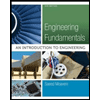 Engineering Fundamentals: An Introduction to Engi...Civil EngineeringISBN:9781305084766Author:Saeed MoaveniPublisher:Cengage Learning
Engineering Fundamentals: An Introduction to Engi...Civil EngineeringISBN:9781305084766Author:Saeed MoaveniPublisher:Cengage Learning
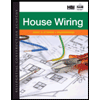 Residential Construction Academy: House Wiring (M...Civil EngineeringISBN:9781285852225Author:Gregory W FletcherPublisher:Cengage Learning
Residential Construction Academy: House Wiring (M...Civil EngineeringISBN:9781285852225Author:Gregory W FletcherPublisher:Cengage Learning Traffic and Highway EngineeringCivil EngineeringISBN:9781305156241Author:Garber, Nicholas J.Publisher:Cengage Learning
Traffic and Highway EngineeringCivil EngineeringISBN:9781305156241Author:Garber, Nicholas J.Publisher:Cengage Learning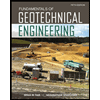 Fundamentals of Geotechnical Engineering (MindTap...Civil EngineeringISBN:9781305635180Author:Braja M. Das, Nagaratnam SivakuganPublisher:Cengage Learning
Fundamentals of Geotechnical Engineering (MindTap...Civil EngineeringISBN:9781305635180Author:Braja M. Das, Nagaratnam SivakuganPublisher:Cengage Learning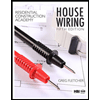 Residential Construction Academy: House Wiring (M...Civil EngineeringISBN:9781337402415Author:Gregory W FletcherPublisher:Cengage Learning
Residential Construction Academy: House Wiring (M...Civil EngineeringISBN:9781337402415Author:Gregory W FletcherPublisher:Cengage Learning

Engineering Fundamentals: An Introduction to Engi...
Civil Engineering
ISBN:9781305084766
Author:Saeed Moaveni
Publisher:Cengage Learning


Residential Construction Academy: House Wiring (M...
Civil Engineering
ISBN:9781285852225
Author:Gregory W Fletcher
Publisher:Cengage Learning

Traffic and Highway Engineering
Civil Engineering
ISBN:9781305156241
Author:Garber, Nicholas J.
Publisher:Cengage Learning

Fundamentals of Geotechnical Engineering (MindTap...
Civil Engineering
ISBN:9781305635180
Author:Braja M. Das, Nagaratnam Sivakugan
Publisher:Cengage Learning

Residential Construction Academy: House Wiring (M...
Civil Engineering
ISBN:9781337402415
Author:Gregory W Fletcher
Publisher:Cengage Learning
Stress Distribution in Soils GATE 2019 Civil | Boussinesq, Westergaard Theory; Author: Gradeup- GATE, ESE, PSUs Exam Preparation;https://www.youtube.com/watch?v=6e7yIx2VxI0;License: Standard YouTube License, CC-BY